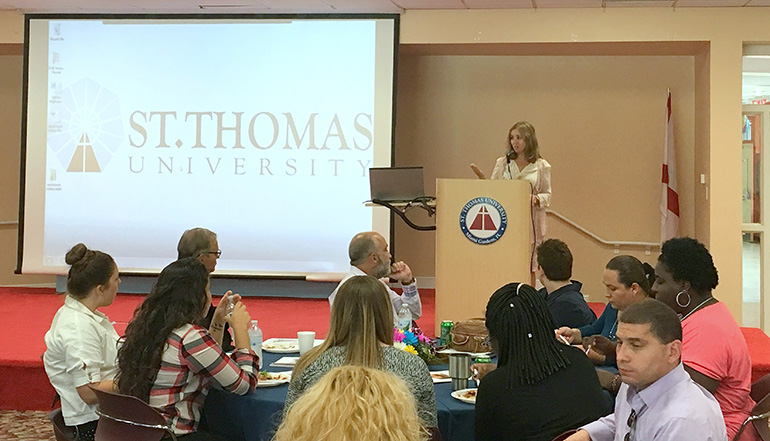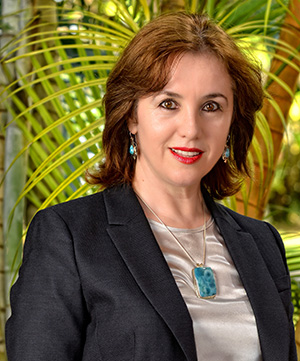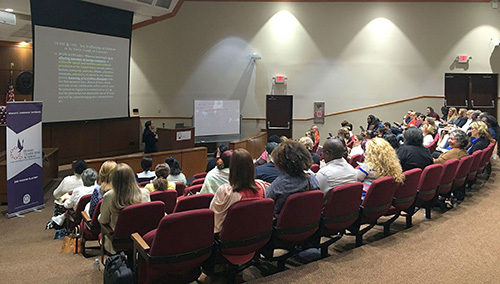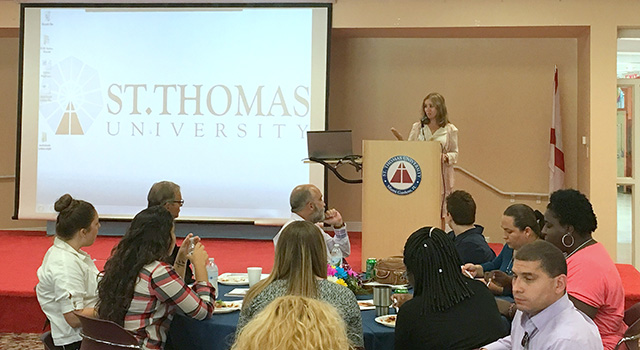By Jim Davis - Florida Catholic

Photographer: COURTESY | St. Thomas U.
Roza Pati addresses students of the Human Trafficking Academy at St. Thomas University, which included police, judges, attorneys, social service workers, healthcare and child protection workers, and even survivors of human trafficking.
MIAMI GARDENS | Roza Pati trains people to fight an enemy we all thought was long gone: slavery.
These days, it has names like human trafficking. But as the St. Thomas University professor said, the effect is little different: barbed wire, barred windows, forced sex, forced labor. Plus the more modern coercion of debt bondage and threats of deportation.
That's why Pati and other experts gather every year for the Human Trafficking Academy, an intensive, weeklong program on the status of the war � and on new weapons and tactics for fighting it.
"Slavery never left us," said Pati, who held the most recent academy Aug. 1-5. "It has changed, morphed into various forms. But it's still here. Combating it is a moral imperative."
The academy, part of St. Thomas' Graduate Program in Intercultural Human Rights, draws a variety of professionals. They include police, judges, attorneys, social service workers, healthcare and child protection workers, even survivors of human trafficking themselves.
The 15 courses deal with a dizzying range of facets. One focuses on how to tell a true trafficking victim from a mere delinquent. Another looks at the neurophysiology of the trauma a victim endures. Others have to do with expunging victims' records or navigating through services for survivors.
Nor is it all lectures. The students are given police reports and told to decide if it's a case of human trafficking. In one video clip, police answer a 911 call about noise in a hotel room. They find two girls who say they're 18 and 19, but deny they're making noise.
After a class discussion, the next clip shows what the officers did: They first asked for ID cards from the girls, then looked in a trashcan in the room � and found condoms.
'A godsend'
Anonymous evaluations often have high praise for the academy. Among them have been "Bravo!", "A godsend," "A-rated," Pati said.
Two graduates of the August edition said they found the interdisciplinary facet especially eye-opening � not just sex trafficking, but also forced labor and other forms. They also valued the range of experts who spoke: not only different disciplines, but also from state, federal and international agencies.

Photographer: COURTESY | St. Thomas U.
Roza Pati, founder of the Human Trafficking Academy at St. Thomas University.
Even during lunchtime, the instructors sat with participants and continued the conversation, said Veraunda Jackson, regional criminal justice coordinator in Central Florida for the Florida Department of Children and Families. And 20 students who took part online were likewise allowed to ask questions.
"That collaboration doesn't happen often," said Jackson, who works in Orlando. "It was a well-rounded curriculum in 40 hours."
The comprehensive, interrelated topics of the academy were also a big help for Dorothy Strouhal, a victim's advocate near Houston. She especially appreciated how the academy included prosecution as well as law enforcement.
"It's like a tag team relay," said Strouhal, founder and president of Beauty Will Rise. "When you hand a case off to a prosecutor, you need to make sure they have all the information they need, so it doesn't fall through the cracks."
She said she plans to send two more people from Beauty Will Rise to the 2017 Human Trafficking Academy. "I'm thankful that someone is looking at the overall scope of human trafficking."
Deception, blackmail
Pati founded the academy with a $500,000 congressional grant through the U.S. Department of Justice. In its four years, the academy has graduated a total of 450 people.
She noted that it fits firmly into Pope Francis' Year of Mercy. As the academy's website quotes him: "Human trafficking is an open wound on the body of contemporary society � It is a crime against humanity."
The pontiff reinforced the connection Aug. 12 with a visit to 20 women at the Pope John XXIII Community, a home in Rome for women who have been rescued from sexual slavery. As part of his visit, he listened to their stories of the physical violence they had suffered.
That attention to the survivors is part of the St. Thomas concern, too, Pati said. "It's about prosecuting criminals, but also about rescuing victims. And about redeeming and empowering society."
And society can use a lot of redeeming: Pati said that no state, including Florida, is immune from human trafficking.
As a video on the academy's website says, people may be offered jobs as restaurant workers, hotel maids or farmworkers. Or an attractive girl in Colombia may be told she can make a lot in America as a model.
"It's $5,000 or $10,000, but no worries, you can pay me back while you're working," a recruiter may say. Once here, though, he charges them for rent, food, clothes and cellphones, and the debts pile up. If they protest, they're blackmailed with the threat of deportation.

Photographer: COURTESY | St. Thomas U.
A session of the Human Trafficking Academy at St. Thomas University, taught by Barbara A. Martinez, assistant U.S. Attorney and chief of the Special Prosecutions Section in Miami.
Even nannies, a seemingly mundane class of workers, may be confined to a family's house in order to care for children round the clock.
"They may have to sleep on the floor beside the bed of the child," Pati said. "And they may be sexually assaulted."
She also cited the Haitian tradition of "restavek," a household servant. The custom began as a way to place poor children with families who were better off, Pati said. For some children, though, it's little more than slavery.
She told of a respected teacher in Miami-Dade who brought an orphan from Haiti as a restavek. The girl cooked and cleaned but wasn't allowed to eat with the family. She was given only rags to wear, and she had to sleep on the floor.
This went on for seven years until a neighbor saw the girl in the back yard, washing herself with a hose. But even when the case came up in court, people in the community sided with the teacher on the grounds of the restavek custom, Pati said.
Targeting vulnerability
Treatment and prevention of human trafficking, not just prosecution, must therefore be part of the solution, Pati said. She mentioned two aspects.
One is what she called "push factors," like poverty and economic inequality, which make victims feel driven to the traffickers. The other influences are "pull factors": public demand for cheap goods and services as well as "adult" entertainment.
That's where the Catholic dimension comes in, Pati said.
"We don’t look at it just as crime, like burglary. It's a matter of human rights, the inherent dignity and worth of each person. The Catholic perspective is not justice in court. It's social justice, equality."
That leads into matters of human rights, equal opportunity, decent education, and social attitudes toward women.
"Vulnerability is what crime syndicates target," she said. "Economic, cultural, civil and political rights should be (placed) together. If people have the opportunity to make a living � a job, shelter, food on the table for their children � they’ll be less vulnerable to the fraudulent promises of traffickers."
Pati knows she's asking for a lot: the total transformation of every society. Does she ever hope to see it?
She offered a measured answer: After a decade or so, the U.S. is just beginning to address human trafficking as it should. But at least it's a start.
"I'm always a believer that what we put our heart and mind and effort into, we can achieve," she said. "It's not a campaign that we can hold and get over with it. We should continue hammering at it.
"Every single person that is saved, or prevented from joining the numbers of the enslaved, is a life saved and a dignity honored."
For more information on the academy, got to www.humantraffickingacademy.org.
Modern slavery: The daunting numbers
- Although Roza Pati directs the Human Trafficking Academy at St. Thomas University, she is moving toward a newer, blunter term: modern slavery. Why? Because the practice persists even though it's illegal everywhere. "Also, it does not have to be a display of modern slaves in chains," she said.
- Using a 2012 study by the International Labor Organization, Pati said that 20.9 million people are caught in some form of involuntary servitude. That's larger than the populations of many nations � including Cuba, Syria, Jamaica, Greece and Sweden.
- Of those 20.9 million people, 19 million are exploited by private organizations, not by government projects like chain gangs. Those 19 million, in turn, include 4.5 million victims of forced sexual exploitation, such as prostitution and sexual tourism � 98 percent of them women and girls.
- And the payoffs of modern slavery are huge, Pati said: about $150 billion in profits every year � a disproportionate $99 billion of it from commercial sexual exploitation.

